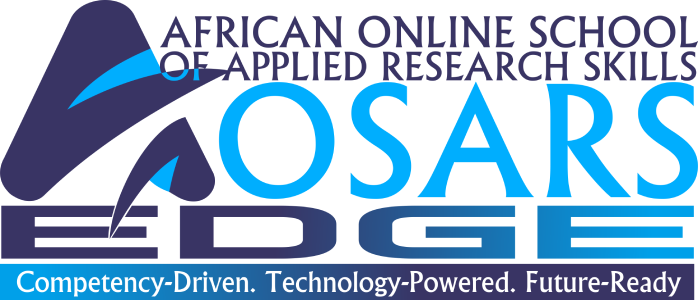AOSARS HOLDS OPEN DAY FOR PHD STUDENTS IN CONCEPT AND PROPOSAL WRITING STAGE

AOSARS HOLDS OPEN DAY FOR PHD STUDENTS IN CONCEPT AND PROPOSAL WRITING STAGE
AOSARS hosted an open day on Saturday, June 21st, 2025, specifically designed for PhD candidates in the early stages of their research journey, focusing on concept paper and proposal development through their comprehensive “Applied Writing Skills for PhD Level Thesis with Ethical AI” program. The session addressed the persistent challenges facing doctoral students, particularly the low completion rates and extended study durations that plague PhD programs. While coursework typically presents manageable challenges, the real difficulties emerge during the proposal and thesis writing phases. The organization identified several critical areas where PhD candidates struggle, with inadequate digital and technical skills representing a significant barrier, particularly the lack of knowledge in relevant software for research work and data analysis. Many students lack the expertise to optimize basic tools like Google for efficiently downloading research materials, missing opportunities to save valuable time, and even more concerning is the absence of skills needed to manage and analyze the large volumes of content once downloaded.
Beyond technical limitations, AOSARS recognized that many candidates lack strong foundations in research methodology and academic writing. Critical thinking skills, essential for logically ordering ideas in research writing, often require development, as academic writing involves more than simply possessing information; it requires the ability to mine, paraphrase, and cite sources correctly while maintaining a coherent argument throughout the work. Recognizing the transformative potential of artificial intelligence in academic research, AOSARS introduced the concept of ethical AI utilization to enhance efficiency across various research processes. The program emphasizes using AI tools for visualizing content structure and brainstorming ideas, while explicitly avoiding direct copying and pasting into thesis documents. AI serves as a powerful tool for compliance checks, including formatting verification and citation style consistency, though the organization stressed that manual writing and strong writing skills remain absolutely essential.
Comprehensive Modular Approach
AOSARS has developed a systematic 15-module program titled “Applied Writing Skills for PhD Level Thesis with Ethical AI” that addresses each identified challenge sequentially. The curriculum begins with foundational elements and progresses through increasingly specialized topics, ensuring students build upon solid groundwork before advancing to complex thesis development. The training covers using AI for tasks like checking compliance with academic standards and generating preliminary ideas, but candidates must develop their own critical evaluation skills to assess AI output effectively. A solid understanding of research methodology enables students to provide effective prompts to AI systems and critically evaluate the responses they receive. The program opens with Module 1, “A Complete Guide to Navigating the PhD Journey,” which provides comprehensive coverage of understanding challenges, mental preparation, and building research readiness for PhD-level thesis writing with ethical AI use, offered free to all participants as the foundational groundwork for their academic journey.
Module 2 focuses on “Ethical AI Utilization in Academic Research,” teaching best practices, limitations, and responsible integration techniques for PhD-level thesis work, addressing the critical need for understanding how to leverage AI tools while maintaining academic integrity and ethical research standards. Module 3, “Sourcing Current and Quality Reference Materials,” provides comprehensive training in accessing journal articles, theses, eBooks, gray literature, and RIS files, teaching students to identify current, relevant, and geographically diverse reference materials for each section of their thesis, utilizing mass downloading techniques to efficiently gather materials specific to their unit of analysis and dependent variables. Technical skills receive dedicated attention through Module 4, “Automated Citation and Referencing Techniques Across Different Academic Styles,” which eliminates manual citation errors and ensures accurate referencing across various academic formatting requirements, addressing one of the most common challenges in thesis writing.
Module 5 addresses “Research Ethics and Academic Integrity,” including plagiarism prevention, AI-generated content detection, and navigating Turnitin output, teaching students to maintain research ethics from the beginning of their research process, understanding how to interpret similarity reports and ensure original scholarship. Module 6 covers “MS Word Formatting Requirements for Academic Documents,” teaching participants to modify blank documents from the outset to automatically incorporate formatting rules, referencing updates, and chapter starting points, a proactive approach that saves considerable time during the writing process and ensures consistency throughout the thesis. The methodology foundation is established through Modules 7 and 8, which provide comprehensive coverage of research methodology fundamentals, with Module 7 focusing on “Quantitative Research Methodology Fundamentals Including Paradigms, Approaches, and Designs,” while Module 8 covers “Qualitative Research Methodology Fundamentals Including Paradigms, Approaches, and Designs,” ensuring students understand the theoretical and practical aspects of both research traditions.
Advanced writing skills development begins with Module 9, “Concept Paper Development and Defense: Structuring Ideas, Preliminary Literature Review, and Research Proposal Framework,” which guides students through the critical transition from initial ideas to structured research proposals, including preparation for defending their concepts before thesis committees. Module 10, “Academic Writing Fundamentals: Structure, Style, Clarity, and Professional Communication,” establishes the essential writing skills necessary for doctoral-level scholarship, teaching students to mine, paraphrase, and cite sources correctly while maintaining coherent arguments throughout their work. The systematic thesis development process continues with Module 11, “Conceptualization and Development of Chapter One (Introduction Chapter),” guiding students through crafting compelling introductions that establish research context, significance, and clear problem statements while integrating ethical AI practices. Module 12 addresses “Conceptualization and Development of Chapter Two (Literature Review) for PhD Thesis Writing,” where students learn to synthesize existing scholarship, identify research gaps, and construct comprehensive literature reviews that support their research objectives using both traditional methods and ethical AI assistance.
Module 13 focuses on “Conceptualization and Development of Chapter Three (Methodology) for PhD Thesis Writing,” helping students articulate their research design choices, justify methodological decisions, and present clear frameworks for data collection and analysis. Module 14 covers “Instrumentation Development and Quality Criteria for PhD Thesis Writing,” addressing the technical aspects of creating valid and reliable research instruments, whether quantitative surveys, qualitative interview protocols, or mixed-methods approaches. The program concludes with Module 15, “Comprehensive Preparation Strategies for Thesis Defense,” which prepares students for the final milestone of their doctoral journey, covering defense preparation, presentation skills, and strategies for articulating and defending research contributions and methodology choices. The program offers exceptional flexibility through both individual module enrollment and strategic package combinations, with AOSARS designing package options that group related modules together, providing students with cost-effective pathways through their doctoral journey while ensuring they build essential skills systematically.
Package Options and Program Delivery
The Foundational Package encompasses Modules 1-6, establishing essential skills in PhD navigation, ethical AI use, sourcing materials, citation management, research ethics, and document formatting, ensuring students master the fundamental tools and techniques necessary for doctoral-level research before advancing to specialized content. The Methodology Package combines Modules 7-8, covering both quantitative and qualitative research methodology fundamentals, ensuring students understand both research paradigms and can make informed decisions about their methodological approaches, regardless of their disciplinary background. The Writing Package encompasses Modules 9-14, covering concept paper development through all thesis chapters and instrumentation development, providing comprehensive writing-focused training that guides students through every stage of thesis composition, from initial concept articulation through final chapter completion. The Complete Program package offers access to all 15 modules, providing comprehensive support throughout the entire PhD journey, ensuring students receive integrated training from initial concept development through successful defense preparation, with each module building upon previous learning to create a cohesive educational experience.
The course follows a modular structure with sequential delivery of one module per Saturday, ensuring a definite timeline for completion, reflecting a strategic shift in focus toward articulation and defense of papers in the AI era, while maintaining emphasis on strong writing skills. The program’s structure ensures that students build foundational competencies before advancing to specialized thesis development skills, with course recordings and presentations available through the AOSARS e-learning platform. While the introductory Module 1 remains free for all members, access to paid module recordings is limited to paying participants for six months to ensure platform sustainability, and the platform facilitates discussions among members within specific module groups, fostering collaborative learning and peer support. Enrollment in advanced modules (9-15) requires completion of foundational modules (1-5) first, ensuring students master essential research skills like citation, paraphrasing, and sourcing materials before advancing to specialized topics, with support available within the e-learning platform’s module groups and direct access to instructors for guidance and issue resolution.
The payment system accommodates international participants through automatic currency conversion for multiple African countries, including Kenya, Uganda, Tanzania, Rwanda, Zambia, Nigeria, and Ghana, while other countries can pay in USD or British pounds, with support for various payment methods including mobile money, bank cards, and PayPal. While the current AI-focused course is delivered live on Saturdays with recordings available afterward, AOSARS acknowledges the time-intensive process of creating high-quality pre-recorded content with captions and AI voice-overs, and the organization continues exploring options for self-paced learning modules in the future. This comprehensive approach represents AOSARS’s commitment to addressing the systemic challenges that prevent PhD candidates from successfully completing their programs, combining traditional research methodology training with cutting-edge AI integration to provide students with both foundational skills and modern tools necessary for academic success. The program’s emphasis on ethical AI use, strong writing skills, and critical thinking prepares candidates not just to complete their degrees, but to excel in an increasingly AI-integrated academic landscape, demonstrating how educational institutions can adapt to technological advances while maintaining academic integrity and rigor through systematic skill development, flexible access options, and ongoing support that creates a pathway for PhD candidates to overcome traditional barriers and achieve their academic goals efficiently and effectively.




